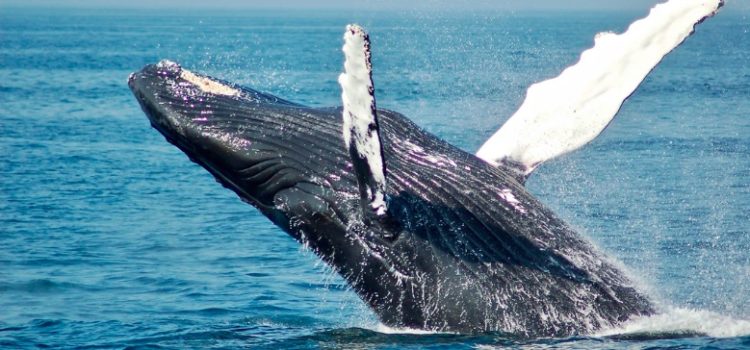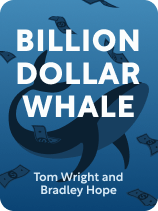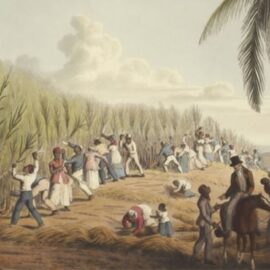

This article is an excerpt from the Shortform book guide to "Billion Dollar Whale" by Tom Wright and Bradley Hope. Shortform has the world's best summaries and analyses of books you should be reading.
Like this article? Sign up for a free trial here.
What’s the Billion Dollar Whale book about? What did Jho Low do and where is he now?
The book Billion Dollar Whale by Tom Wright and Bradley Hope explains the story of Jho Low, a Malaysian financier accused of stealing billions of dollars from Malaysian sovereign funds. The book sheds light on the corrupt practices used by individuals, banks, and governments to commit fraud.
Read on for an overview of Wright and Hope’s book Billion Dollar Whale: The Man Who Fooled Wall Street.
Billion Dollar Whale Book Overview
The Billion Dollar Whale book by Tom Wright and Bradley Hope details the exploits of Jho Low, a Malaysian financier who allegedly stole billions of dollars from Malaysian sovereign funds. In order to leverage these heists, Low courted figureheads from international banks and governments by branding himself as a successful, powerful businessman. While the scandal was ultimately exposed in 2015, and many of his associates were prosecuted, Low remains at large.
Wright and Hope covered Low’s story in The Wall Street Journal. Their Pulitzer-nominated coverage of the scandal helped bring public awareness and scrutiny to Low and his associates. Billion Dollar Whale, originally published in 2018, sheds light on the corruption and unsavory practices that individuals, banks, and governments used to commit fraud. The book also describes how Low spent the money he stole, primarily on luxurious parties, gambling binges, and shopping sprees (the title references this pattern; “whale” is a term some casinos and nightclubs use to describe customers who spend extravagant amounts of money gambling or partying).
Low Learned to Cultivate Connections by Controlling His Image
In their book Billion Dollar Whale, the authors explain that Jho Low’s beginnings—he was born and raised in Penang, Malaysia—were far from humble. Low’s father, Larry Low, had made millions through the sale of his shares in a garment company. However, attending the UK’s prestigious Harrow boarding school, and later on the University of Pennsylvania’s Wharton School in the US, the younger Low was surrounded by the children of some of the wealthiest, most influential families in the world. According to Wright and Hope, while Low’s family was wealthy, its riches and status paled in comparison to those of these young members of the global elite.
At school abroad, Low learned to carefully manipulate his image to convince the rich and powerful that he belonged among them. As Wright and Hope describe, Low threw parties designed to elevate his status. For example, in boarding school, he invited several classmates to vacation in Malaysia. He hosted them in an extravagant, rented mansion, claiming it was his own. The ruse worked, convincing Low’s young classmates of his wealth. Throughout his time at Wharton, Low continued to earn a reputation for the lavish parties he hosted.
Low Began Building Influence in the Middle East and Malaysia
Once his reputation was established, Low began looking for ways to leverage his new connections. Wright and Hope note that Low began visiting the Middle East with his Wharton friends, hoping to be introduced to potential future business partners.
Wright and Hope describe how Low soon began to forge relationships with powerful political and financial figures overseas. Notably, Low met with Yousef al Otaiba, a political adviser who would later become an ambassador, and Khaldoon Khalifa al Mubarak, who ran Mubadala Development, a sovereign wealth fund in the United Arab Emirates (UAE). Shadowing al Mubarak, Low was able to observe the freedom with which sovereign wealth funds operate. Backed by the UAE’s government, al Mubarak and the other men at the head of Mubadala had billions at their disposal, with little oversight or regulation.
At home in Malaysia, Low used his father’s connections to get in touch with the family of Deputy Prime Minister Najib Razak. Najib, who would become prime minister in 2009, aspired to a more expensive lifestyle, much like Low. As Wright and Hope describe, Low tried to turn his connection with Najib’s family into a real estate deal. However, Low immediately ran into problems, promising profits to his new friends, while lacking the capital to fund the project. While the deal ultimately fell through, Low’s newfound friendship with Najib was an important one.
Low Set His Sights on a Malaysian Sovereign Wealth Fund
When Najib became prime minister, he created the 1Malaysia Development Berhad (1MBD), a sovereign wealth fund. As Wright and Hope note, the fund’s stated purpose was to use government money to invest in green energy for Malaysia’s future. According to the authors’ explanation in the Billion Dollar Whale book, Low learned through his experience with Mubadala that involvement in a sovereign wealth fund would lend him unregulated access to larger sums of money than ever before.
In an attempt to leverage his influence with Najib, Low proposed that in addition to funding green energy, 1MDB’s money could also be used as a political slush fund for Najib to pull from as needed. To further strengthen his position, Low connected Najib to his old friend, Ambassador Otaiba of the UAE, and through this connection was able to ensure that the Abu Dhabi government would invest alongside 1MDB in its future ventures.
Thanks to his relationship with Najib, as well as his role in connecting Najib to Abu Dhabi, Low convinced Najib to put him in charge of 1MDB. Wright and Hope write that the relationship was mutually beneficial: With Low in charge of the fund, Najib could rest easy knowing that his co-conspirator would be able to assist him in moving money around. And, for Low, working closely with Prime Minister Najib meant that he was free to operate with no fear of intervention from the Malaysian government.
As he had in the past, Low continued to operate in secrecy, taking no official role at 1MDB, instead staffing the fund’s board with associates who could lend 1MDB more legitimacy. Only Low himself, his associates, and Najib knew that Low was really in charge of the fund.
Low Manipulated Financial Systems to Take Money From 1MDB
Wright and Hope note that Low quickly set up a deal in 2009 between 1MDB and PetroSaudi, an oil company controlled by Prince Turki Bin Abdullah of Saudi Arabia. While Prince Turki’s domestic influence was limited, Low took advantage of his royal status to convince Najib to invest in the PetroSaudi deal. Low’s plan was for PetroSaudi and 1MDB to co-invest in an oil exploration venture—together the two funds would buy up land, look for oil, and sell what they found. The sum total of this investment was billions of dollars. Low was indifferent to whether or not the oil investment became successful. As Wright and Hope argue, Low’s real purpose was to quietly siphon money away from the massive transactions that the deal involved.
With Najib on board, Low’s next step was to convince banks to both process the deal and to send Low a cut. However, sending large sums to an individual as part of a transaction between sovereign funds made some institutions uncomfortable. When the first few banks refused to work with Low, he adopted a new strategy. Instead of trying to ease suspicion, Low chose to avoid it altogether. According to Wright and Hope, if a particular bank scrutinized Low’s transactions, he would simply test the waters at other institutions until he found one that was willing to work with him without questioning him. Using this strategy, Low found a group of financial institutions and individuals who were willing to cooperate with him on the PetroSaudi deal.
As the deal went through, Low once again used shell companies to take his cut of the funds. As a result of his strategic maneuvering, Low managed to get banks to wire hundreds of millions of dollars to offshore accounts he alone controlled.
The 1MDB Scheme Continued to Expand
Wright and Hope note that as Low’s lifestyle grew increasingly expensive, he continued to set up deals at 1MDB that allowed him to take the money he needed to keep up with his expenses.
In their book Billion Dollar Whale, the authors describe how Low’s past successes brought him increased legitimacy and a wider network of contacts. Because he had worked with reputable institutions, individuals and banks viewed him with less scrutiny. On his next major deal, Low brought together the International Petroleum Investment Company (IPIC), a sovereign wealth fund owned by Saudi royalty, with Goldman Sachs on a plan to sell bonds through 1MDB. Goldman Sachs’s involvement is especially notable considering that they were once again engaging in questionable practices only a few years after their actions contributed to the subprime mortgage bubble crash.
As with the PetroSaudi deal, Low wasn’t trying to set 1MDB up for success. Low set up the deal with IPIC and Goldman Sachs solely so that he could poach a cut of the transactions involved in the deal, taking the money and moving it into his accounts or those of his associates.
Low and His Associates Began to Attract the Attention of Journalists
Low’s friendships with the rich and famous, as well as his extravagant parties, brought him an increasing amount of attention from journalists and paparazzi. According to Wright and Hope, as Low’s lifestyle brought him into the spotlight, he attempted to shift the public narrative around his wealth. Just as he had done with his boarding school friends, Low tried to convince the media that his family was much wealthier than they really were. While Low had previously attempted to brand himself as a dealmaker in order to build a network, now that he was established, his goal was to disguise the source of his wealth. Attributing his money to inheritance served that purpose.
As Wright and Hope note, in spite of Low’s best efforts, journalists began to investigate both Low’s debauchery and 1MDB’s dealings, with some stories beginning to link the two, albeit without strong evidence. Notably, The New York Times published a front-page story on Low, linking him to Najib. None of the media coverage of Low was able to conclusively implicate him in any wrongdoing until Justo, the disgruntled former PetroSaudi employee, contacted blogger and journalist Clare Rewcastle-Brown. Using Justo’s evidence, Rewcastle-Brown published a story in 2015 detailing 1MDB’s fraudulent deals. As Wright and Hope describe, the story exposed the scandal and kicked off a wave of international investigations.
Low’s Scheme Unraveled as Authorities Closed In
Wright and Hope note in their book Billion Dollar Whale that while foreign governments were able to prosecute individuals and institutions within their jurisdictions, at home in Malaysia, Prime Minister Najib took extreme measures to protect himself and his allies, including Low. According to the authors, Najib’s regime imprisoned Justo and publicly attempted to discredit him. With Justo silenced, Najib made sure to keep stories about 1MDB and Low out of state-controlled media. He threatened journalists and political opponents with violence. During this period, a Malaysian anti-corruption prosecutor is alleged to have been murdered by Najib’s regime.
However, despite his dictatorial actions, Najib could not hold on to power forever. Eventually, Wright and Hope write, Najib lost a reelection bid in 2018 and was subsequently prosecuted and sentenced by the opposition government.
Low Evaded Capture by Hiding Out in Countries That Refused to Pursue Him
Finally, the authors conclude the Billion Dollar Whale book by explaining how Low evaded capture. Authorities in Malaysia and the United States seized any of his assets that they could access, but Low escaped with plenty of money still discreetly squirreled away.
While his associates faced fines and prosecution, Low himself managed to evade capture, slipping away into countries where he knew he wouldn’t be extradited. Low kept a low profile, being only occasionally sighted in Bangkok and Shanghai. As Wright and Hope note, Low’s money still protected him in China, where the government was happy to shelter him, believing that his influence in Malaysia could eventually prove useful.

———End of Preview———
Like what you just read? Read the rest of the world's best book summary and analysis of Tom Wright and Bradley Hope's "Billion Dollar Whale" at Shortform.
Here's what you'll find in our full Billion Dollar Whale summary:
- A chronicle of the rise and fall of Malaysian entrepreneur, Jho Low
- The tactics Low used to succeed as a con man
- The political and financial context for Low's scheme






